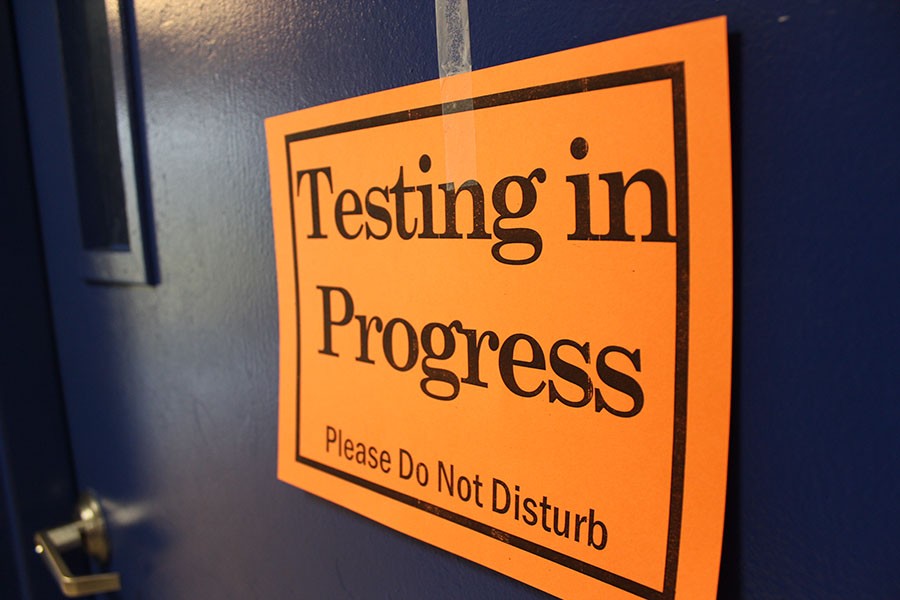The Reason Behind ERB Testing
What is the rationale for students taking these annual standardized tests?
This sign outside Mr. DiGiovanni’s room indicates ERB testing is taking place inside.
For TBS students, the week of April 11 is synonymous with testing, or more specifically, ERBs. However, that brings up an important question: What are ERBs and why do students take these tests? ERB stands for “Educational Records Bureau.” However, beyond its title, the structure and purpose of the ERB testing is significant, and perhaps worth the intense testing schedule.
According to https://www.erblearn.org/ (the official website of the Educational Records Bureau), ERB is a “non-for-profit member organization providing admission and achievement assessment as well as instructional services for PreK – Grade 12.” ERB testing is much like other standardized tests – a compilation of multiple choice and open response. There are 10 individual tests that comprise the ERBs: Verbal Reasoning, Vocabulary, Constructed Response, Reading Comprehension, Math 1, Quantitative Reasoning, Constructed Response Math, Writing Mechanics, Writing Comprehension/Skills, and Math 2. With each section ranging from 25 to 40 minutes and all 10 tests taken over four days, it begs the question, why? Why are ERBs administered at all?
“I think we have ERBs to test our knowledge of the material we learn in class,” said eighth grader Nicky Amato. “The ERBs help achieve an understanding of how well each class knows the general material. Also [the purpose] is to compare our average sores to other private schools,” he said. Sixth grader Emma Mayberry agrees, as she believes that The Benjamin School administers the ERBs “so we know where we are as students and how well we are taking in the information the School is providing us compared to other schools.”
Not only do the ERB test results allow the School to compare itself to other schools, but it also provides a measuring stick for TBS to make improvements. “We like to use the test to look at the achievement of the individual student, we like to asses our curriculum, and the effectiveness of our curriculum from year to year,” said Head of Middle School Mr. Charles Hagy. “There’s a lot of internal work done to assess our curriculum through the ERB.”
For example, in previous years, the results of the vocabulary test was not where the administration wanted it to be. Because of this, the administration and faculty members got together to enhance the curriculum as they brought Word Voyage on board and have also had students make videos pertaining to specific vocabulary words. Since then, vocabulary scores have gone up considerably.
However, the ERB tests are not actually graded, nor do they affect student’s averages. Despite this fact, the ERB tests do matter for both students and the school. The results from the ERB tests help students get placed in courses in the upcoming year. Additionally, the general results are used for accreditation and credentials purposes; these results are necessary in ensuring that The Benjamin School is living up to its FCIS (Florida Council of Independent Schools) and NAIS (National Association of Independent Schools) standards.
“Some sort of assessment of your students internally and against other schools in the nation is necessary,” said Hagy. “I think that responsible schools do this type of thing. They find the best metric they can find to gauge achievement and as we use it, look for ways to improve.” commented Hagy.
So it seems that, though long and intense, the ERB testing is a necessary component not only to The Benjamin School and its students, but to schools nationwide who want to be sure their students are measuring up to the competition.









